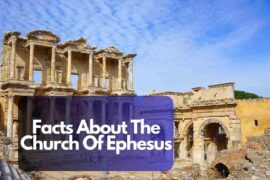Should a Pastor have a Church credit card? Whether or not a pastor should have a church credit card is a topic of ongoing debate and controversy within the religious community.
On the one hand, a credit card can provide a convenient and efficient way for pastors to respond to the needs of their congregations, particularly in cases of emergency or unforeseen expenses.
On the other hand, there is a risk of misuse or abuse of church funds and concerns about transparency and accountability.
In this context, it is important to examine the arguments for and against pastors having a church credit card and the considerations that should be considered when establishing policies and procedures for their use.
Ultimately, the goal is to ensure that any use of church funds is responsible, transparent, and in line with the values and mission of the religious organization.
Contents
Should A Pastor Have A Church Credit Card
A church credit card is issued to a pastor or other church leader intended for church-related expenses. These expenses may include office supplies, travel expenses, or ministry-related purchases.
The credit card may be issued in the name of the individual pastor or the church itself. It may have specific policies and restrictions on its use to ensure that any expenses incurred are for legitimate church purposes.
Church credit cards are intended to provide a convenient way for pastors to manage church expenses, but they can also raise concerns about financial oversight, transparency, and accountability.
Purposes Of A Church Credit Card
The primary purpose of a church credit card is to provide a convenient and efficient way for pastors and church leaders to manage church-related expenses. Some of the key purposes of a church credit card include:
1. Paying For Ministry-Related Expenses
A church credit card can be used to pay for expenses related to ministry activities, such as travel expenses for a pastor or supplies for a church event.
2. Managing Cash Flow
A credit card can help manage cash flow by allowing the church to make necessary purchases before the funds are available.
3. Emergency Expenses
In an emergency, a credit card can be a quick and easy way to cover expenses the church may not have available funds.
4. Building Credit
By using a credit card responsibly and making timely payments, a church can build its credit rating, which can be important for obtaining loans or other financial support.
5. Rewards And Benefits
Some credit cards offer rewards or benefits for using them, such as cashback, travel points, or other perks. By using a church credit card for legitimate expenses, the church may be able to take advantage of these benefits.
A church credit card can be a useful tool for managing church expenses. Still, it is important to ensure it is used responsibly and transparently to avoid potential issues or controversies.
Brief Overview Of The Controversy Surrounding Pastors And Church Credit Cards
There has been ongoing controversy and debate surrounding pastors and church credit cards.
Critics argue that using church credit cards can lead to financial impropriety or misuse of church funds, creating a perception of a lack of transparency or accountability.
Some high-profile cases of pastors using church funds for personal expenses or lavish purchases have fueled this controversy and raised concerns among congregants and the wider public.
Proponents of church credit cards argue that they can provide a convenient and efficient way for pastors to manage church expenses, particularly in cases of emergency or unforeseen expenses.
They also argue that proper oversight and accountability measures can be put in place to ensure that any expenses incurred are for legitimate church purposes and are in line with the values and mission of the religious organization.
The controversy surrounding pastors and church credit cards underscores the importance of responsible financial management and transparency in religious organizations and the need for clear policies and guidelines to ensure that any use of church funds is ethical, accountable, and in line with the values and mission of the church.
Solutions For Reimbursement Or Use Of Personal Funds
There are alternative solutions to using a church credit card that can help address concerns about financial oversight and accountability. Two such solutions are reimbursement and the use of personal funds.
1. Reimbursement
In this solution, pastors and other church leaders make purchases with their own personal funds and then submit receipts to the church for reimbursement.
This can help ensure that expenses are only incurred for legitimate church purposes and that all expenses are properly documented and approved before being paid.
2. Use Of Personal Funds
Another solution is for pastors and other church leaders to use their personal credit or debit cards for church-related expenses and then seek reimbursement from the church.
This can provide greater transparency and accountability, as the individual incurs all expenses and is reimbursed by the church.
Both solutions can help address concerns about financial impropriety or misuse of church funds while still providing a way for pastors and church leaders to manage church-related expenses.
However, it is important to establish clear policies and guidelines around reimbursement and use of personal funds, to ensure that any expenses incurred are for legitimate church purposes and are in line with the values and mission of the religious organization.
Considerations For Implementing A Church Credit Card Policy For Pastors
Implementing a church credit card policy for pastors requires careful consideration of various factors. Here are some key considerations to keep in mind:
1. Purpose
The policy should clearly define the purpose of the credit card, such as the types of expenses that can be charged to the card and the specific ministry-related activities for which it can be used.
2. Approval Process
The policy should outline the approval process for obtaining a church credit card, including who is authorized to issue the cards and the criteria for eligibility.
3. Limits
The policy should specify credit limits for individual cards and the total credit limit for all cards issued. This can help prevent overspending and ensure that expenses are managed within budget.
4. Documentation
The policy should require documentation for all credit card purchases, such as receipts and invoices.
This can help ensure that expenses are being used appropriately and per the church’s policies and procedures.
5. Reimbursement
The policy should outline the reimbursement process of expenses charged to the church credit card.
This can include the submission of receipts and other documentation, as well as any deadlines for submission.
6. Monitoring And Auditing
The policy should provide for regular monitoring and auditing of credit card expenses to ensure that they are being used appropriately and in accordance with the church’s policies and procedures.
7. Consequences
The policy should specify consequences for misuse or abuse of the church credit card, such as revocation or disciplinary action.
8. Training
The policy should require training for pastors who issued a church credit card, including guidelines for proper use and documentation.
Developing a church credit card policy for pastors requires careful consideration and planning.
By clearly defining the purpose, approval process, limits, documentation, reimbursement, monitoring and auditing, consequences, and training requirements, churches can effectively manage ministry-related expenses and ensure that resources are being used appropriately and in accordance with the church’s values and mission.
Procedures To Ensure The Appropriate Use Of Church Funds
Churches are responsible for ensuring that the funds they receive are used appropriately and in accordance with their mission and values.
Here are some procedures that can help to ensure the appropriate use of church funds:
1. Establish Policies And Procedures
Churches should establish clear policies and procedures for the use of church funds. These policies should outline the criteria for determining whether an expense is appropriate, the process for requesting and approving expenses, and the documentation requirements for all transactions.
2. Create A Budget
A budget is a critical tool for managing church funds. It provides a framework for determining how much money can be spent and where it can be spent.
Churches should create an annual budget that includes all anticipated income and expenses.
3. Assign Responsibility
Churches should assign responsibility for managing church funds to a specific person or group.
This person or group should be responsible for implementing the policies and procedures, managing the budget, and ensuring all transactions are properly documented.
4. Segregate Duties
To prevent fraud or misuse of church funds, churches should segregate duties among different individuals. For example, the person who approves expenses should not be the person who makes payments.
5. Monitor Transactions
Churches should monitor all transactions to ensure they are appropriate and properly documented. This can include reviewing bank statements, invoices, receipts, and other documentation.
6. Conduct Audits
Churches should conduct regular audits to ensure that their financial practices comply with their policies and procedures.
Audits can be conducted internally or by an independent third-party auditor.
7. Educate Staff And Volunteers
Churches should educate their staff and volunteers on the importance of the appropriate use of church funds and the policies and procedures in place. This can include training sessions and regular reminders.
By establishing clear policies and procedures, creating a budget, assigning responsibility, segregating duties, monitoring transactions, conducting audits, and educating staff and volunteers, churches can ensure that their funds are used appropriately and in accordance with their mission and values.
These procedures help to promote transparency and accountability and can help to build trust among church members and the broader community.
Conclusion
Pastors’ use of church credit cards is a controversial issue that requires careful consideration and responsible financial management.
While a church credit card can provide a convenient way to manage church-related expenses, it is important to establish clear policies and guidelines to ensure that any expenses incurred are for legitimate church purposes and are in line with the values and mission of the religious organization.
Alternative solutions, such as reimbursement and personal funds, can also be considered.
By implementing responsible financial practices and policies, churches can promote transparency and accountability and ensure their resources are used to serve their mission.








